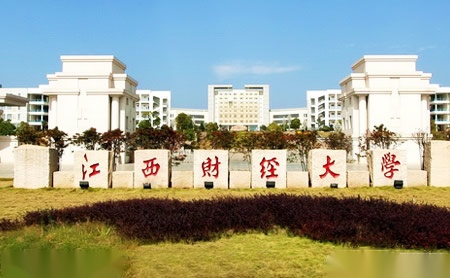江西财经大学品牌怎么样 申请店铺
外推网助力江西财经大学品牌出海!将品牌入驻外推网,定制江西财经大学品牌推广信息,可以显著提高江西财经大学产品曝光,简直是跨境电商爆单神器!目前仅需1000元/年哦~

始于1923年,十大金融财经大学,财政部/教育部/江西省人民政府共建而成,以经济/管理类学科为主,法/工/文/理/艺术等学科协调发展的高等财经学府
江西财经大学是一所财政部、教育部、江西省人民政府共建,以经济、管理类学科为主,法、工、文、理、艺术等学科协调发展的高等财经学府。
办学历史:江西财经大学的前身为1923年秋创办的江西省立商业学校,1958年成立江西财经学院,文革期间几经更名并遭停办,1978年复校,1980年成为财政部部属院校,1996年更名为江西财经大学,2000年学校管理体制由财政部主管转变为由江西省主管,2012年成为财政部、教育部、江西省人民政府共建高校。
办学特色:办学以来,学校秉承“信敏廉毅”的校训和“敬业乐群、臻于至善”的大学精神,形成了培养具有“信敏廉毅”素质的创新创业型人才的办学特色。学校坚持质量立校、特色兴校、人才强校、法德治校,形成了在红土地上培育创新创业型人才的办学模式,走出了在欠发达地区办人民满意高校的路子。
办学条件:学校坐落英雄城南昌,东临赣江碧水,西接梅岭烟霞,北吸锦绣庐山之灵气,南纳雄伟井冈之精神。现有蛟桥园、麦庐园、枫林园、青山园四个校区。占地面积共2200余亩,建筑面积90余万平方米,馆藏各类图书643.6万册(含电子图书280万册)。
机构设置:学校设有工商管理学院、财税与公共管理学院、会计学院、国际经贸学院、经济学院、金融学院、统计学院、信息管理学院、旅游与城市管理学院、软件与通信工程学院(用友软件学院)、外国语学院、人文学院、法学院、艺术学院、体育学院(国防教育部)、马克思主义学院共16个教学学院,EMBA教育学院、国际学院、创业教育学院(职业技术学院)、继续教育学院共4个管理型学院,以及1个独立学院。
设有《当代财经》杂志社、江西经济发展与改革研究院、产业经济研究院、协同创新中心、高等教育研究所、财政大数据分析中心、鄱阳湖生态经济研究院、金融管理国际研究院、生态文明研究院等9个独立设置科研机构;有江西省战略性新兴产业发展监测、预警与决策支持协同创新中心,江西建成小康社会决策支持协同创新中心,法治江西建设协同创新中心,江西省生态文明制度建设协同创新中心等4个省级协同创新中心;有规制与竞争研究中心、会计发展研究中心、金融发展与风险防范研究中心、产业集群与企业发展研究中心、生态文明与现代中国研究中心、江西法治政府研究中心、江西省应用统计研究中心等7个人文社科研究基地;有鄱阳湖生态经济研究院、财税研究中心、江西省经济预测与决策研究中心等3个江西省哲学社会科学研究基地;有中澳亚太资本市场、现代商务研究中心、创新与战略人力资源管理研究中心、社会工作与社会管理研究中心、科技金融研究中心、法治政府研究中心等与学院合署或挂靠学院的科研机构。
学科专业:学校现有经济学、管理学、法学、工学、文学、理学、艺术等学科门类;拥有应用经济学、理论经济学、管理科学与工程、工商管理、统计学共5个博士后流动站;应用经济学、理论经济学、管理科学与工程、工商管理和统计学共5个一级博士学位授权点,28个二级博士学位授权点,14个一级硕士学位授权点,70个二级硕士学位授权点,17个专业硕士学位授权点,52个本科专业。
教学工作:拥有江西省大学生创新创业园1个、中央与地方共建实验室42个、省级实验示范中心8个。学校于1994年(全国较早)实行学分制,学生可以选修双专业(学位)。
科研工作:学校在2017年取得国家社科基金年度项目立项23项,其中重点项目2项,一般项目19项,青年项目2项。近年来,10余项研究成果编入国家社科规划办《成果要报》并送中央领导决策参考,百余篇研究成果、调研报告获中央及省部领导批示。立项教育部人文社科项目100余项,在国际刊物及国内刊物发表论文600余篇。
学校依托学科优势、人才优势和智力优势,紧密联系江西经济社会发展实际,聚焦江西经济、社会和文化发展与建设重大现实问题,深入开展调查研究,为政府、企业和社会管理部门提供具有重大决策参考价值的研究成果、政策建议和咨询意见,充分发挥了学校在服务地方经济社会发展中“智囊团”与“决策库”的作用。
师资队伍:现有教职工2179人,专任教师1294人,其中正高级专业技术人员257人、副高级专业技术人员444人;具有博士学位的690人; 博士生导师124人;硕士生导师642人。国内外330余名学者、专家和企业家受聘为我校客座教授。
招生就业:通过多年发展,形成了以本科教育和研究生教育为主体,继续教育、留学生教育为补充的办学格局。学校面向全国30个省、直辖市、自治区招生,其中在28个省份一本招生。现有各类在籍学生4万余人,全日制在校生3万余人。全日制本科生有2.2万人,各类研究生近5千人。就业工作保持良好态势。
国际办学:学校坚持开放办学,与美国纽约州立大学石溪分校、加拿大里贾纳大学、英国南安普顿大学、法国南特高商、澳大利亚莫纳什大学、芬兰奥卢大学、丹麦奥尔堡大学等34个国家和地区的96所高校建立了稳定的合作与交流关系。1998年开始,学校先后获批中美合作培养MBA、中澳合作培养MBA等研究生项目。2010年正式成为国际交换生组织(ISEP)中国大陆成员大学。学校加盟了国际社会工作教育联盟组织(IASSW)和国际商学院联盟(NIBS),获批为全国托福考点、GRE考点、GMAT考点、ACCA考点。学校2002年成立国际学院,开办本科教学试验班,设有会计学(国际会计)、国际经济与贸易(国际商务)、金融学(国际金融)、金融学(注册金融分析师)四个专业方向,聘任美国、加拿大等国家高校的教师授课,现有在校生2000多人。学校还在相关学院开设了会计学(ACCA方向)、会计学(CIMA)、金融风险管理(FRM)、国际市场营销、国际贸易等涉外专业,教学方式和资源与国际接轨,目前初步形成了“教学相长、中西合璧、外引内联、高位嫁接”的国际化办学特色。自2003年以来,有2000余名学生在校期间分赴英国、美国、德国、法国、芬兰、荷兰等国高校交换或交流学习,400余名学生毕业后赴牛津大学、剑桥大学等大学攻读硕士或博士学位。目前学校面向来华留学本科生开设了全英文授课的国际商务专业,面向来华留学硕、博士开设了全英文授课的国际贸易学、金融、会计、统计等四个专业。2016年招收来华留学生363人,生源来自40余个国家。2016年5月学校与英国考文垂大学合作建设的孔子学院正式揭牌运行。
党建团学工作:学校党委认真贯彻执行党的教育方针,牢牢掌握党对学校工作的领导权,把方向、管大局、作决策、保落实,坚持立德树人,把培育和践行社会主义核心价值观融入教书育人全过程;牢牢把握学校意识形态工作领导权;坚持和完善党委领导下的校长负责制,不断改革和完善学校体制机制;推进党的建设,有效发挥基层党组织战斗堡垒作用和共产党员先锋模范作用,形成了“心齐、气顺、风正、劲足”的良好局面。学校扎实推进创新创业人才培养工程,完善“三个课堂联动、三类实践互促”的人才培养机制;“国旗日日升、好事月月评、红歌年年唱”成为学校思想政治教育工作的重要品牌。
学校基本形成了以国家助学贷款为渠道、以勤工助学为手段、以奖、助学金为主导、以社会资助为补充、以困难补助为保障、以学校“奖、免、补、缓”等各项资助为特色的“六位一体”多元化经济困难学生资助体系和机制,年发放各类助学金5000多万元。学校设立各类奖学金18项,年奖励总金额320万余元。
学校办学以来,已为国家培养各类人才10余万人,多数学生现已成为所在单位的业务骨干和中坚力量,甚至成为商界、政界、学界的精英。
Since 1923, Jiangxi University of Finance and economics, a top ten University of Finance and economics, was jointly established by the Ministry of Finance / Ministry of education / Jiangxi Provincial People's government. It is an advanced University of Finance and economics with the main subjects of economy / management and the coordinated development of law / Engineering / literature / Science / Art and other subjects. It is jointly established by the Ministry of finance, the Ministry of education and the people's Government of Jiangxi Province, with the main subjects of economy and management, such as law, engineering, literature, science and art Higher financial institutions with coordinated development of disciplines. History of running a school: the predecessor of Jiangxi University of Finance and economics is Jiangxi provincial business school founded in the autumn of 1923, Jiangxi University of Finance and economics was founded in 1958. During the cultural revolution, it was renamed and closed several times. It was resumed in 1978. In 1980, it became a school affiliated to the Ministry of finance. In 1996, it was renamed Jiangxi University of Finance and economics. In 2000, the management system of the school changed from the head of the Ministry of finance to the head of Jiangxi Province. In 2012, it became a University jointly established by the Ministry of finance, the Ministry of education and the people's Government of Jiangxi Province. School running characteristics: since its establishment, the school has adhered to the school motto of "trust, sensitivity and integrity" and the university spirit of "respect, work and enjoy the masses, and strive to be the best", forming the school running characteristics of cultivating innovative and entrepreneurial talents with the quality of "trust, sensitivity and integrity". The school adheres to the principles of quality, characteristics, talents and morality. It has formed a school running mode of cultivating innovative and entrepreneurial talents on the red soil, and has gone out of the way of running universities with people's satisfaction in underdeveloped areas. School conditions: the school is located in Nanchang, the hero city, with the clear water of Ganjiang River in the East, the haze of Meiling mountain in the west, the spirit of Lushan Mountain in the north, and the spirit of Jinggang Mountain in the south. There are four campuses: Jiaoqiao garden, Mailu garden, Fenglin garden and Qingshan garden. Covering an area of more than 2200 mu, with a building area of more than 900000 square meters, it has a collection of 6.436 million books (including 2.8 million electronic books). Institutions: School of business administration, School of finance, taxation and public management, School of accounting, School of international economy and trade, School of economics, School of finance, School of statistics, School of information management, School of tourism and urban management, School of software and Communication Engineering (UFIDA Software School), School of foreign languages, School of humanities, School of law, School of art, School of Physical Education (National Defense Education) There are 16 teaching colleges in Marxism college, 4 management colleges in EMBA Education College, International College, Entrepreneurship Education College (vocational and Technical College), continuing education college and 1 independent college. It has 9 independent scientific research institutions, including contemporary finance and economics magazine, Jiangxi economic development and Reform Research Institute, industrial economy research institute, collaborative innovation center, Higher Education Research Institute, financial big data analysis center, Poyang Lake Ecological Economy Research Institute, International Financial Management Research Institute, Ecological Civilization Research Institute, etc.; it has Jiangxi strategic emerging industry development monitoring, early warning and There are four provincial collaborative innovation centers, namely, the Collaborative Innovation Center for decision support in well-off society, the Collaborative Innovation Center for rule of law in Jiangxi, and the Collaborative Innovation Center for ecological civilization system in Jiangxi. They are the Research Center for regulation and competition, the Research Center for accounting development, the research center for financial development and risk prevention, the Research Center for industrial cluster and enterprise development There are 7 research bases of Humanities and Social Sciences, including the center, the research center of ecological civilization and modern China, the research center of Jiangxi government under the rule of law, and the research center of Jiangxi applied statistics; 3 research bases of philosophy and Social Sciences, including Poyang Lake Ecological Economy Research Institute, finance and Taxation Research Center, and Jiangxi economic prediction and decision research center; and 3 research bases of philosophy and Social Sciences, including China Australia Asia Pacific Capital Market and modern business research center Center, innovation and Strategic Human Resource Management Research Center, social work and social management research center, science and Technology Finance Research Center, research center of government under the rule of law and other research institutions jointly or affiliated with the college. Disciplines and specialties: the university now has disciplines such as economics, management, law, engineering, literature, science, art, etc.; it has five post doctoral mobile stations including applied economics, theoretical economics, management science and engineering, business management, statistics; five first-class doctoral degree authorization points including applied economics, theoretical economics, management science and engineering, business management and statistics , 28 second level doctoral degree authorization points, 14 first level master's degree authorization points, 70 second level master's degree authorization points, 17 professional master's degree authorization points and 52 undergraduate majors. Teaching work: it has one innovation and entrepreneurship Park for college students in Jiangxi Province, 42 laboratories jointly built by the central and local governments, and 8 provincial experimental demonstration centers. In 1994, the credit system was implemented in the University (earlier in the country), and students can choose Dual Major (degree). Scientific research: in 2017, the school obtained 23 annual projects approved by the National Social Science Foundation, including 2 key projects, 19 general projects and 2 youth projects. In recent years, more than 10 research results have been incorporated into the results report of the national social science planning office and submitted to the central leadership for decision-making reference. More than 100 research results and research reports have been approved by the central and provincial leaders. More than 100 humanities and Social Sciences projects of the Ministry of education have been approved, and more than 600 papers have been published in international and domestic journals. Relying on the advantages of disciplines, talents and intelligence, the university closely links with the actual economic and social development of Jiangxi Province, focuses on the major practical problems in the economic, social and cultural development and construction of Jiangxi Province, conducts in-depth investigation and research, provides research results, policy suggestions and advisory opinions with great decision-making value for the government, enterprises and social management departments, and gives full play to the University's Serve the role of "think tank" and "decision base" in local economic and social development. Teaching staff: there are 2179 teachers and 1294 full-time teachers, including 257 senior professional and technical personnel and 444 deputy senior professional and technical personnel; 690 with doctor's degree; 124 doctoral supervisors; 642 master's supervisors. More than 330 scholars, experts and entrepreneurs at home and abroad have been employed as visiting professors of our university. Enrollment and Employment: through years of development, a school running pattern has been formed with undergraduate education and graduate education as the main body, and continuing education and international student education as the supplement. The university enrolls students from 30 provinces, municipalities and autonomous regions, including 28 provinces. At present, there are more than 40000 students of various nationalities and more than 30000 full-time students. There are 22000 full-time undergraduates and nearly 5000 postgraduates. Employment has maintained a good momentum. International Education: the University adheres to open education, and has established stable cooperation and exchange relations with 96 universities in 34 countries and regions, including Stony Brook University of New York State University, Regina University of Canada, Southampton University of England, Nantes business of France, Monash University of Australia, olu University of Finland, and auerbarg University of Denmark. Since 1998, the school has been approved the Sino US cooperative MBA, Sino Australia cooperative MBA and other graduate programs. In 2010, it officially became a member University of ISEP in mainland China. The school has joined the International Association for Social Work Education (IASSW) and the international business school alliance (NIBS), and has been approved as the national TOEFL test center, GRE test center, GMAT test center and ACCA test center. In 2002, the University set up the International College, and set up the undergraduate teaching experimental class. It has four professional directions: Accounting (International Accounting), international economy and trade (International Business), Finance (International Finance), Finance (Registered Financial Analyst). It employs teachers from colleges and universities in the United States, Canada and other countries to teach, and now has more than 2000 students. The university has also set up accounting (ACCA direction), accounting (CIMA), financial risk management (FRM), international marketing, international trade and other foreign majors in relevant colleges. The teaching methods and resources are in line with the international standards. At present, the university has initially formed the international school running characteristics of "teaching and learning, Chinese and Western integration, external introduction and internal connection, high grafting". Since 2003, more than 2000 students have gone to universities in the United Kingdom, the United States, Germany, France, Finland, the Netherlands and other countries to exchange or exchange studies. After graduation, more than 400 students have gone to Oxford University, Cambridge University and other universities to study for master's or doctor's degrees. At present, the University offers four majors, namely, international business, finance, accounting and statistics, which are all taught in English for undergraduates studying in China, and for masters and doctors studying in China. In 2016, 363 overseas students were enrolled from more than 40 countries. In May 2016, the Confucius Institute jointly constructed by the University and Coventry University was officially opened for operation. Party building and League learning: the school Party committee earnestly implements the party's education policy, firmly grasps the party's leadership over the school work, takes the direction, manages the overall situation, makes decisions, and ensures the implementation, adheres to morality, builds people, integrates the cultivation and practice of socialist core values into the whole process of teaching and educating people, firmly grasps the leadership of ideological work in the school, and adheres to and improves the president under the leadership of the Party committee Responsibility system, continuous reform and improvement of school system and mechanism, promotion of Party construction, and effective play of the role of grass-roots party organizations as battle fortresses and the vanguard and exemplary role of Party members have formed a good situation of "harmony of heart, harmony of Qi, integrity of wind and strength of feet". The school firmly promotes the innovation and Entrepreneurship Talent Training Project, improves the talent training mechanism of "three classroom linkage and three types of practice mutual promotion"; the national flag is rising day by day, good things are evaluated month by month, red songs are sung year by year "has become an important brand of Ideological and political education in the school. The school has basically formed a "six in one" diversified financial aid system and mechanism with the national student loan as the channel, work study as the means, awards and grants as the leading role, social assistance as the supplement, aid for difficulties as the guarantee, and school's "awards, exemptions, supplements, and delays" as the characteristics. Each year, it has issued more than 50 million yuan of all kinds of grants. The university has set up 18 kinds of scholarships, with a total annual reward of more than 3.2 million yuan. Since its establishment, the school has trained more than 100000 talents of all kinds for the country. Most of the students have become the business backbone and backbone of their units, and even become the elites of business, politics and academia.
本文链接: https://brand.waitui.com/83a222729.html 联系电话:请联系客服添加 联系邮箱:请联系客服添加


















 浙公网安备 33011802001999号
浙公网安备 33011802001999号
